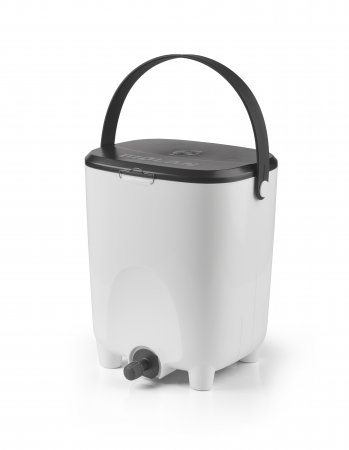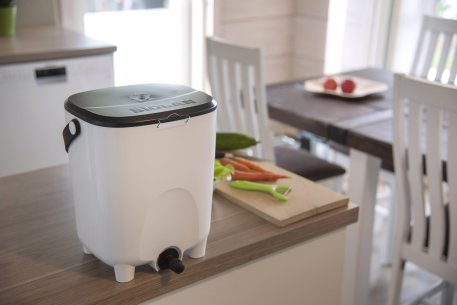How to use Bokashi?
Place a thin layer of organic waste in the Bokashi bin. The first layer is laid on the tray. To speed up fermentation, chop up larger pieces of organic waste so that the microbes can start to ferment the waste as efficiently as possible. Sprinkle about two tablespoons of Biolan EM® bran on organic waste every time you add waste to the bin. Tamp the organic waste down with the pressing plate. Leave the plate in place on top of the layer of organic waste. Do not add more than one litre of organic waste at a time. Close the hinged lid of the Bokashi bin carefully using the clip.
Try to avoid opening the Bokashi bin too often. Add organic waste once a day, for instance, by keeping the organic waste to be added to the Bokashi bin in the kitchen in a lidded container.
Fermentation produces liquid which seeps to the bottom of the Bokashi bin. You can drain this liquid off easily into a suitable container or the drain using the spigot on the side of the bin.
When the Bokashi bin is full, close the lid carefully and keep the container at room temperature for two weeks. During this time, you can drain the liquid off every so often. Gas may form in the bin during fermentation. To let it out, open the lid. Always close the lid carefully afterwards, using the clip.
After emptying the Bokashi bin, rinse it with water. Also remove the tray and rinse it separately.
How to process the fermented matter?
Fermented organic waste cannot be used as soil or fertiliser as such. It must first be processed by composting. When you choose the method for processing the fermented matter, make sure it
does not attract vermin.
You can compost the fermented matter, for example, in a rodentsafe composter (such as Biolan Quick Composter 220eco, Biolan Composter for Summer Cottage Use) by mixing it well with the composter contents. You can make a separate post-processing container where depleted or low-nutrient soil and fermented organic waste are laid in layers. Cover the organic waste with soil and allow to compost for at least two weeks until the organic waste becomes indistinguishable from the soil.





